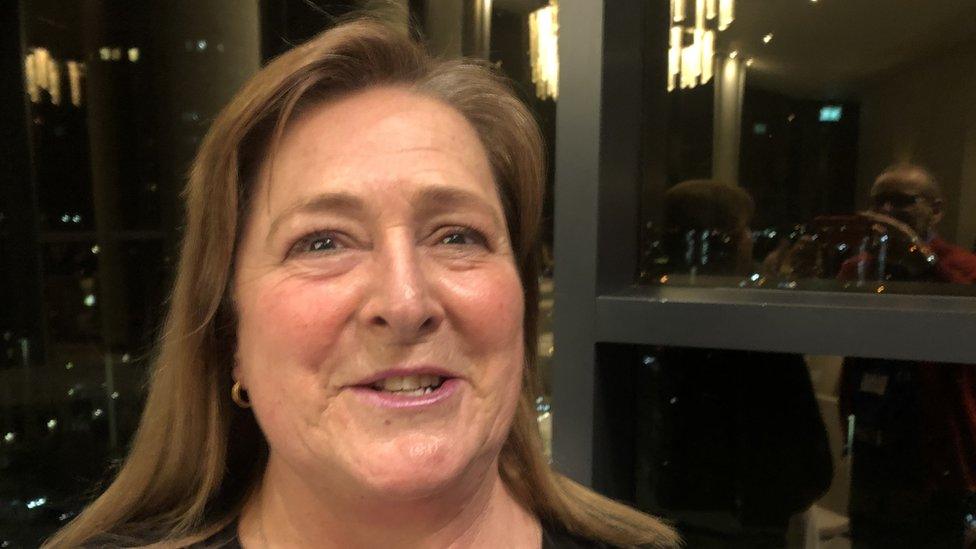Climate assembly considers flying bananas
- Published

Marc considers himself a "typical person" and not an environmentalist
A citizens' climate assembly has been established by Commons select committees. It aims to understand public preferences on how the UK should tackle climate change. Roger Harrabin reports from the second session.
Flying bananas, fashionable indoor fleeces, carbon allowances and synthetic fuels for aircraft were on the agenda for weekend number two of the UK’s climate change assembly.
The 110 members of the assembly chosen to reflect a cross section of society raised a vast array of issues.
Their task is to give MPs and the government a sense of public priorities as the UK battles to reduce emissions to almost zero by 2050.
The indoor fleece question was a surprise. One participant asked whether fast fashion firms should make fashionable indoor clothes that save carbon emissions by actually keeping the wearer warm.
The organisers requested that most participant surnames were withheld from this article.
Read about the first session of the citizens' assembly
Turning up the heat
The enquiry is pertinent – the average temperature of a British home rose approximately 5C between 1970 and 2010, external. A whole generation has grown up considering it a basic human right to inhabit the home in little more than underwear.
The trend’s not helpful for a government wanting to reduce emissions from heating.
Assembly members grappled in small groups with other contentious climate issues such as transport, farming and food.

Mark believes a mixture of tax, technology and rule-making will be needed
One expert witness explained the radical idea of personal carbon allowances – that’s when everyone’s given an annual carbon budget to emit CO2.
If you overshoot your budget with too much heating, driving and flying, you must buy permits from someone who’s used less than their allowance. It would apply, for instance, to flying.
Fairness is key
Tracey, a carer from Northern Ireland, liked the idea. She said her group favoured climate schemes that increased fairness.
She told me: “It’s going to create more equality for everyone, so if you have lots of money, people are probably going to take lots of flights because you can afford it. But you’ll probably end up paying extra for that.”
Asked whether such a revolutionary idea would be acceptable to the public she replied: “Well, it seemed to go down pretty well in there (the assembly).”
Chris from Oxford had previously expressed doubts about the urgency of tackling climate change.
But he’s happy to contribute to the task of choosing the right policies as we head towards 2050.
Synthetic fuels thumbs-down
Chris welcomed, for instance, the chance to interrogate some of the proposals on the sort of synthetic fuels proposed by the aviation industry.
He said: “Synthetic fuels seemed like a really persuasive solution – but then we heard they’re not ready – just not ready.
“Contrast that with something like heat pumps, and they are ready. It’s good to have been able to make the comparison.”

Amanda engaged in the discussion on food supply
Amanda from Kent was delighted by the unexpected discussion on bananas. She said: “It’s an eye-opener all the new things I'm learning - incredible.
“Today I was in one of the groups talking about what we buy, with bananas being a big discussion.
“If bananas are flown in they’re really bad for carbon footprint but if they’re shipped in there are hardly any (emissions) at all.”
'I'm no environmentalist'
The assembly members hold a wide range of views. I asked Marc from Newcastle if he considered himself an environmentalist.
Marc laughed: “No, no. I’m the typical person who would change their iPhone every year, car every three years… just pick up what I wanted from the supermarket.
“But after all this (information from the assembly) you start questioning.
“It’s hard because everyone’s going to want to keep the same standard of living - not make massive changes. But we’ll have to. So it’s going to be interesting how we get to that happy medium. If we educate people properly we could be on to something good.”
But can the assembly help produce that something good? Mark from Manchester (not to be confused with Marc) thought that it could, by showing MPs and the government a policy roadmap that the public might accept.
He believes a mixture of tax, technology and government rule-making will be needed.
'Put up taxes'
“I wouldn't mind taxing, because it’s for the greater good. Regulations need to be in place. Something needs to be set so governments can’t overrule things that have been set in stone.”
But does he really think MPs will take notice? He’s cautiously optimistic: “I’ve spoken local MPs about it,” he said. “They were passionate and they’ve visited (the assembly) … so, it’s positive!
The next assembly weekend is at the end of the month. It reports to Parliament at the end of April.
Follow Roger on Twitter., external
Correction 13 February 2020: A previous version of this story incorrectly stated the average temperature of a British home has risen 6% since the 1970s. It has been corrected to 5C.